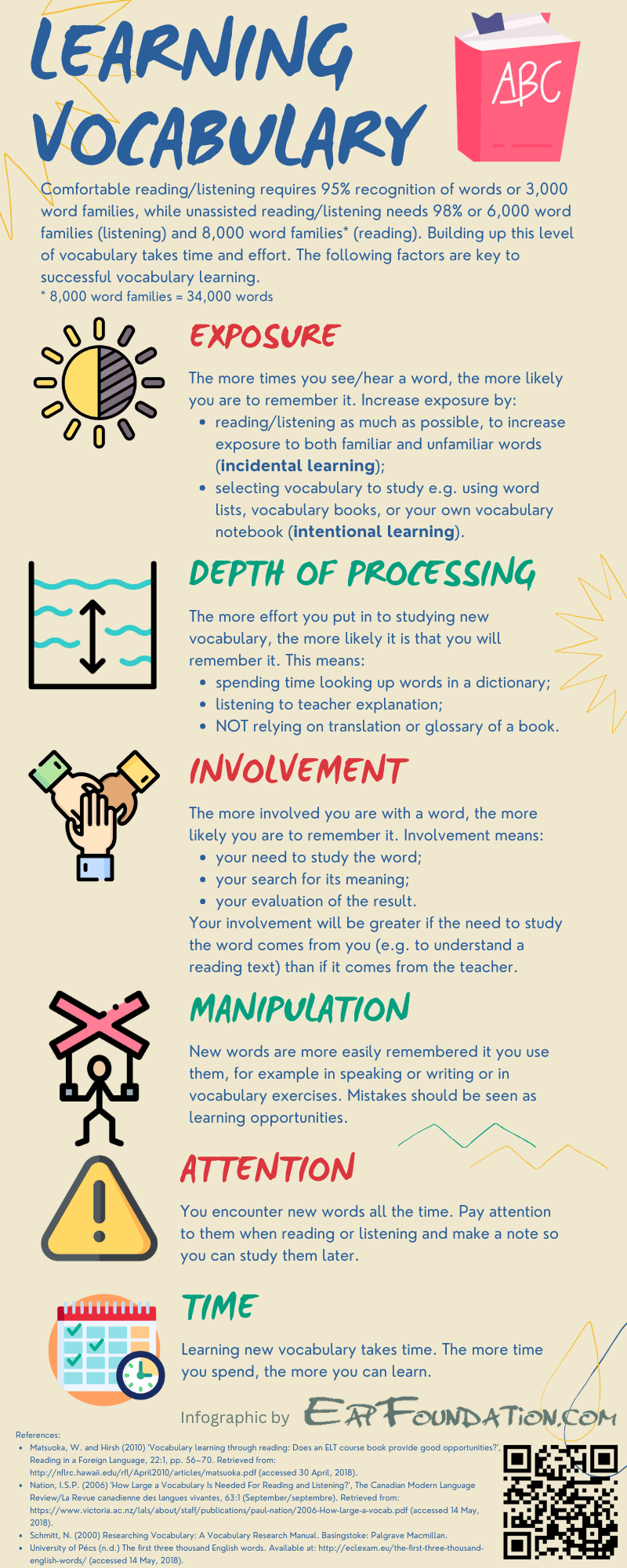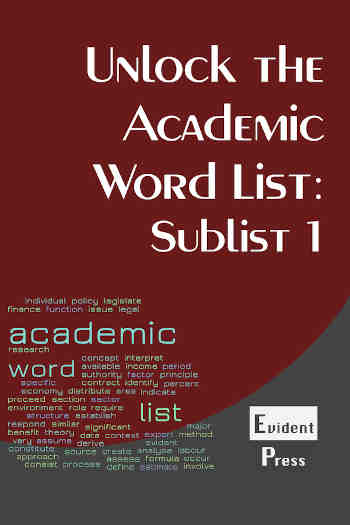Show AWL words on this page.
Show sorted lists of these words.


 







|
 Podcast is loading. Problems? Too slow? You can also access the Podcast by
clicking here.
Podcast is loading. Problems? Too slow? You can also access the Podcast by
clicking here.This message will disappear when then podcast has fully loaded.
Learning vocabulary is an important aspect of academic study. This page considers how much vocabulary to learn, the type of vocabulary to study, including formulaic phrases, and gives some tips on how to learn vocabulary. There is a checklist at the end for checking understanding.
How much vocabulary is enough?
It is often observed that without grammar, little can be communicated, but without vocabulary, nothing can be communicated. It is clear then that vocabulary is essential for any language learner. Precisely how much vocabulary is needed is less clear. A minimum estimate for comfortable reading and listening comprehension is 95% recognition of words, which would need around 3,000 word families. The 95% level, however, would entail some strain on the reader/listener, who would probably need assistance for adequate comprehension. Most writers put the figure for unassisted reading and listening at 98% recognition, which research has shown to require 6,000 word families for listening and 8,000 for reading. This, however, refers to word families not individual words. Being familiar with 6,000 word families in fact requires knowledge of over 28,000 words, while 8,000 word families requires knowledge of over 34,000 words. This is a lot of words.
What vocabulary should be studied?
As mentioned in the section on what academic vocabulary is, when selecting vocabulary for academic study, it is important to focus on three types of vocabulary, namely general vocabulary suitable for academic use, academic vocabulary, and subject-specific vocabulary. In view of what was mentioned above, it will be important to study not just new words but their extended word family. This area of vocabulary study is considered in more detail in the next section, along with other important aspects of word knowledge such as part of speech, spelling, pronunciation and usage.
Formulaic phrases
It is important to remember that vocabulary study is not just about single words. English has a considerable amount of formulaic language, in other words fixed or frequently occurring combinations of words. Most writers estimate the level of formulaic phrases in English at between 30% and 50%, with one study suggesting that about one third of academic writing is formulaic in nature, and close to two thirds for spoken English. Whatever the exact amount, learning such phrases will greatly improve speaking and writing fluency. Examples of formulaic phrases for academic use are collocations, such as those in the Academic Collocation List (ACL) (e.g. allow access, major advantage, survey data), and discourse markers, for instance transition signals in writing (In conclusion..., because of...) and signpost phrases for presentations (My presentation will last about..., Let's now move on to...). Discourse markers and other lexical bundles, i.e. phrases of three or more words commonly occurring together, occur more frequently in written English than collocations (around 20% for the former and 10% for the latter). Other types of formulaic language, namely idioms and phrasal verbs, are far less common in academic English (around 3% for the former, and 0.5% for the latter). The Academic Formulas List (AFL) provides some common examples of 'formulas' (i.e. lexical bundles) in academic English. Using the AFL highlighter on this page reveals the following phrases from the Academic Formulas List:
- a list of, an example of, as part of, for example in, in other words, in the case of, may not be, the level of, there is a, this is a, this type of, to use the, at the end, in more detail, it is clear, it is important to, such as those, the next section
Check it out! To highlight the AFL phrases on this page, click here. To highlight the collocations in the ACL (Academic Collocation List), click here. Not including examples, there are 19 phrases from the AFL (60 words), and 11 from the ACL (22 words). This is 5% and 2% of the total. Although this is fewer than the estimates above, this number includes only ACL and AFL phrases, in other words the most common academic collocations and lexical bundles, rather than all of them. The figures support the point that lexical bundles are more common than collocations.
Learning vocabulary
Learning vocabulary is a slow process. It is usually necessary to encounter a new word or phrase many times before it is learnt. One important factor in vocabulary acquisition is therefore to increase exposure. This means practising reading or listening as much as possible, to increase exposure to both familiar and unfamiliar words. This type of learning is called incidental vocabulary learning, and is how native speakers learn vocabulary. In the case of second language learners, however, incidental learning may not be enough, and more intentional methods will be needed. An example of an intentional method is when a teacher introduces new vocabulary in class. Another is when a student studies vocabulary, for example using word lists or vocabulary books. Another and highly useful type of intentional learning is reviewing vocabulary which has been recorded in some way, for example in a vocabulary notebook.
Another important factor in learning vocabulary is depth of processing or involvement. These two terms relate to two different hypotheses about how vocabulary is learned. The former suggests that the more effort a learner has to put in to studying new words, the more likely it is that they will remember them. This means, for example, the student spending time looking up vocabulary in a dictionary or the teacher explaining new words, rather than having vocabulary translated or the meaning given in the glossary of a book. The latter idea, known as the involvement load hypothesis, suggests that the greater the involvement, the more likely it is that learning will take place. Involvement is considered to comprise three areas: the learner's need to study the word, their search for the word's meaning, and their evaluation of the result. While the search and evaluation components are similar to the depth of processing model, this idea stresses the need to study the word, which is greater if it comes from the student (for example, to understand a reading text or complete an assignment) than if it comes from the teacher (for example, a list of words for students to study).
Another important factor is manipulation of new vocabulary items. This means using the new words, for example in speaking or writing. As noted above, it can take some time to acquire mastery of new words, and mistakes will therefore be made. These, however, provide further learning opportunities. In the initial stages of vocabulary study, simpler methods of manipulating words will be useful, such as classroom exercises or exercises in a textbook.
Other factors in vocabulary learning are attention and time. Attention means focusing on vocabulary. This could include work by the teacher to highlight and teach vocabulary. It also includes effort by the learner to notice unfamiliar vocabulary and make attempts to study and learn it. Time relates to how long the learner spends studying vocabulary. The more time that is spent, the more the learner will learn.
In short, learning new vocabulary involves the following factors:
- exposure - read/listen more, focus on vocabulary, review vocabulary notebooks
- depth of processing - look up words in a dictionary, listen to teacher explanations
- involvement - focus on words which are needed most
- manipulation - try to use the word in speaking/writing, do exercises
- attention - pay attention to new vocabulary
- time - spend time studying vocabulary
References
Matsuoka, W. and Hirsh (2010) 'Vocabulary learning through reading: Does an ELT course book provide good opportunities?', Reading in a Foreign Language, 22:1, pp. 56–70. Retrieved from: http://nflrc.hawaii.edu/rfl/April2010/articles/matsuoka.pdf (accessed 30 April, 2018).
Nation, I.S.P. (2006) 'How Large a Vocabulary Is Needed For Reading and Listening?', The Canadian Modern Language Review/La Revue canadienne des langues vivantes, 63:1 (September/septembre). Retrieved from: https://www.victoria.ac.nz/lals/about/staff/publications/paul-nation/2006-How-large-a-vocab.pdf (accessed 14 May, 2018).
Schmitt, N. (2000) Researching Vocabulary: A Vocabulary Research Manual. Basingstoke: Palgrave Macmillan.
University of Pécs (n.d.) The first three thousand English words. Available at: http://eclexam.eu/the-first-three-thousand-english-words/ (accessed 14 May, 2018).
Vilkaitė-Lozdienė, L. (2016). 'Formulaic language is not all the same: comparing the frequency of idiomatic phrases, collocations, lexical bundles, and phrasal verbs', Taikomoji kalbotyra, 8. Available from: https://www.researchgate.net/publication/291691467_Formulaic_language_is_not_all_the_same_comparing_the_frequency_of_idiomatic_phrases_collocations_lexical_bundles_and_phrasal_verbs (accessed 14 May, 2018).
Checklist
The following checklist summarises the information on learning vocabulary.
| Area | OK | Comments |
| I understand that learning vocabulary entails knowledge of a large number of words (perhaps over 34000!). | ||
| I know the type of vocabulary I need to study. | ||
| I understand what formulaic language is (e.g. collocations and discourse markers). | ||
| I understand why exposure is important in learning vocabulary, and ways to increase exposure, e.g. read/listen more, focus on vocabulary, review vocabulary notebooks. | ||
| I know how increased depth of processing can help me to remember words, e.g. look them up in a dictionary, listen to teacher explanations. | ||
| I know how increased involvement can help me to remember words, e.g. by focusing on words which are needed most. | ||
| I understand the importance of manipulating words, i.e. trying to use them in speaking/writing or doing exercises. | ||
| I understand that it is important to pay attention to new vocabulary, and to spend time studying vocabulary. |




